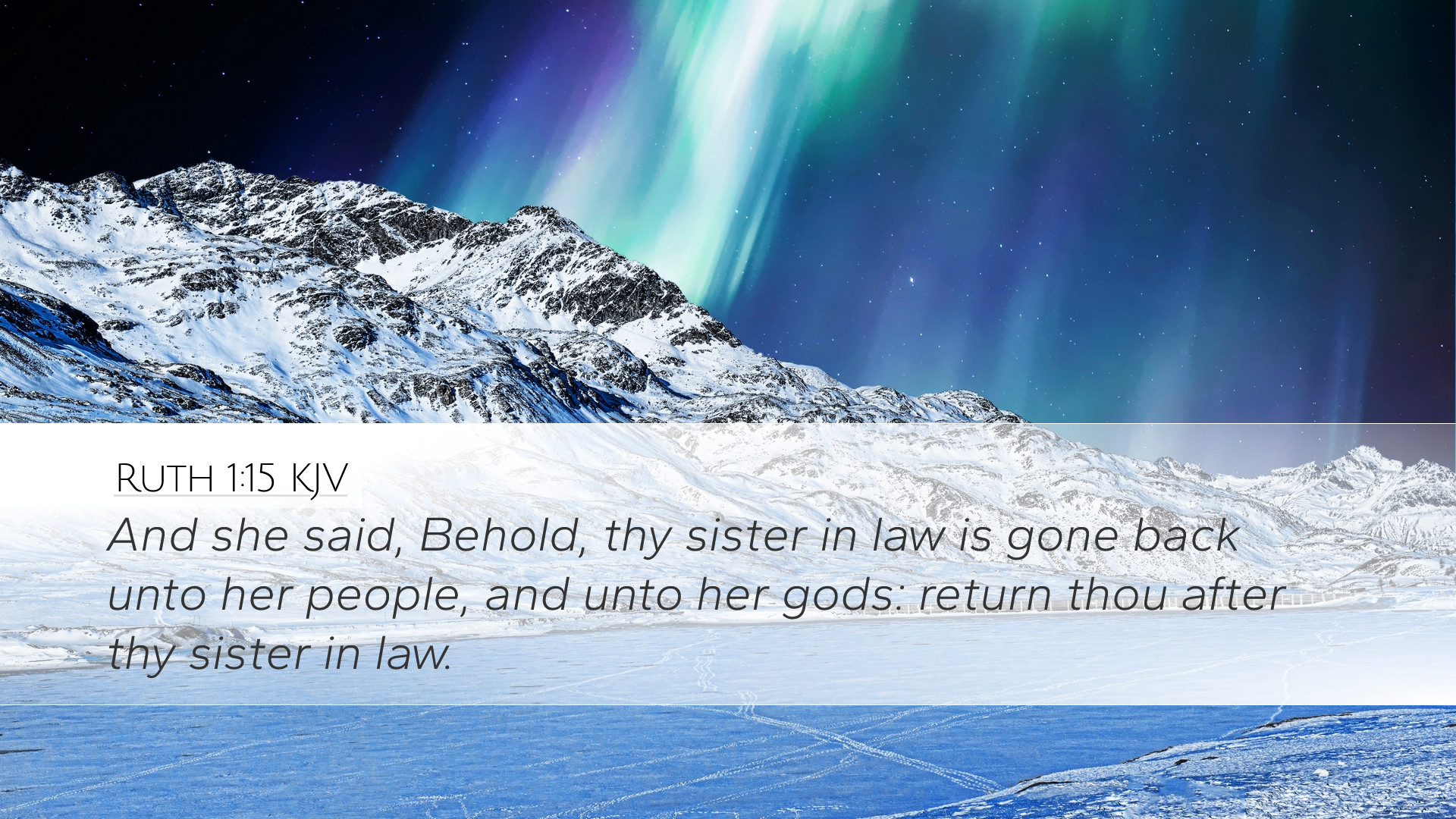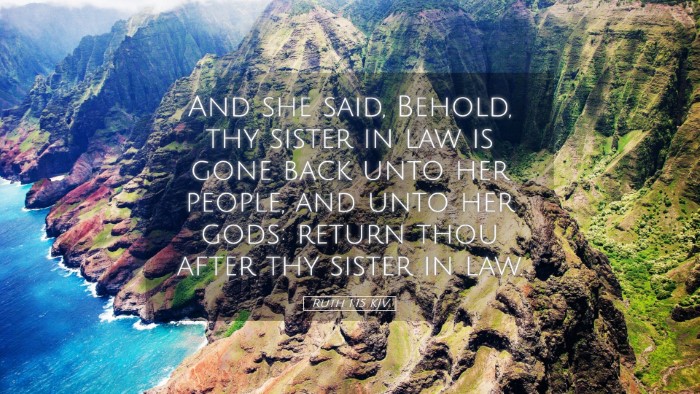Old Testament
Genesis Exodus Leviticus Numbers Deuteronomy Joshua Judges Ruth 1 Samuel 2 Samuel 1 Kings 2 Kings 1 Chronicles 2 Chronicles Ezra Nehemiah Esther Job Psalms Proverbs Ecclesiastes Song of Solomon Isaiah Jeremiah Lamentations Ezekiel Daniel Hosea Joel Amos Obadiah Jonah Micah Nahum Habakkuk Zephaniah Haggai Zechariah MalachiRuth 1:15
Ruth 1:15 KJV
And she said, Behold, thy sister in law is gone back unto her people, and unto her gods: return thou after thy sister in law.
Ruth 1:15 Bible Commentary
Commentary on Ruth 1:15
Verse Text: "And she said, Behold, thy sister-in-law is gone back unto her people, and unto her gods: return thou after thy sister-in-law."
Introduction
The book of Ruth is a remarkable narrative that showcases themes of loyalty, faith, and divine providence. In Ruth 1:15, we find Ruth's determination contrasted with the choice made by Orpah. The commentary on this verse reveals deeper theological implications and character insights crucial for pastors, students, and theologians.
Insights from Public Domain Commentaries
Matthew Henry
Matthew Henry highlights the significance of Ruth's commitment. He notes that Naomi attempts to persuade Ruth to return to her home, just as Orpah did. This verse illustrates a moment where the allure of returning to familiar surroundings and cultural practices is strong. Yet, Ruth's response reflects an inner conviction that transcends mere familial ties.
- Divine Calling: Henry points out that Ruth’s choice symbolizes a divine calling. Her allegiance is not to her past but to the God of Israel, showing that true faith often demands leaving behind former identities.
- Contrasting Responses: The contrast between Orpah and Ruth serves as a sermon in choices. Orpah returns to her people and gods, suggesting a return to the superficial safety of her old life. Ruth, however, is willing to embrace uncertainty for the sake of her relationship with Naomi, representing faith regardless of circumstances.
Albert Barnes
Albert Barnes offers a historical and cultural perspective on this verse. He explains that Ruth's resolve to stay with Naomi was not simply about companionship but a profound decision rooted in faith.
- Significance of the Decision: Barnes notes that Ruth's decision here involves a complete break from her old life. This transition mirrors the exacting demands of discipleship, where followers must often renounce their former ways and associations.
- Influence of Orpah's Choice: He also discusses how Orpah's decision reflects a common human inclination towards familiar comfort over the unknown journey of faith, emphasizing that faith's path is often less traveled.
Adam Clarke
Adam Clarke delves into the implications of ‘return’ in the context of loyalty and obligation. He comments on the idea that Orpah's returning was a societal expectation, one that Ruth defies.
- The Nature of Commitment: Clarke suggests that Ruth's steadfastness serves as a powerful illustration of true commitment, akin to the New Testament call to follow Christ fully. It speaks to the heart of sacrificial love and loyalty.
- Relationship with God: He argues that Ruth’s choice reveals a shift in her spiritual identity. By choosing Naomi and the God of Israel, Ruth lays aside her former life, indicating that faith involves a relational journey rather than mere adherence to tradition.
Theological Implications
The verse acts as a pivot for significant theological discourse. It invites dialogue on several key topics:
- Faith and Loyalty: Ruth’s steadfastness is not just a personal decision but a theological stance. It raises questions about what it means to be loyal in faith amidst competing cultural narratives.
- Divine Providence: The passage hints at God’s providence, where Ruth’s willingness to follow Naomi leads her to a significant role in the lineage of David and ultimately Christ, emphasizing that God works through seemingly insignificant choices.
Practical Applications
For pastors and scholars, Ruth 1:15 serves as a poignant reminder of the nature of commitment in faith.
- Encouraging Commitment: It challenges leaders to foster environments where commitment to Christ is celebrated, encouraging believers to prioritize relationships that may lead them to deeper faith.
- Human Choice and Divine Plan: Preachers can draw parallels between Ruth's decision and the believer's journey, showing how God can use personal sacrifices for His greater purpose.
Conclusion
Ruth 1:15 stands as a beacon of faith in the face of societal pressures, showcasing the dichotomy of choice between the path of least resistance and the journey of true commitment. Drawing from Matthew Henry, Albert Barnes, and Adam Clarke, we uncover a multifaceted understanding that enriches our appreciation of this sacred text. It beckons us, like Ruth, to embrace faith boldly, forging ahead with the assurance that our choices align with the divine narrative.


